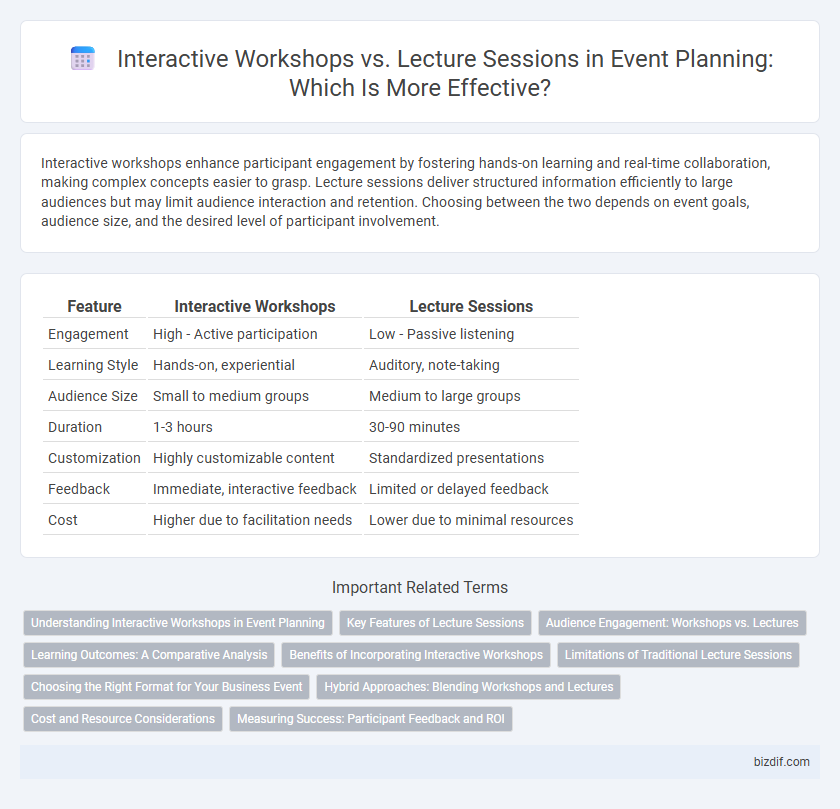Interactive workshops enhance participant engagement by fostering hands-on learning and real-time collaboration, making complex concepts easier to grasp. Lecture sessions deliver structured information efficiently to large audiences but may limit audience interaction and retention. Choosing between the two depends on event goals, audience size, and the desired level of participant involvement.
Table of Comparison
| Feature | Interactive Workshops | Lecture Sessions |
|---|---|---|
| Engagement | High - Active participation | Low - Passive listening |
| Learning Style | Hands-on, experiential | Auditory, note-taking |
| Audience Size | Small to medium groups | Medium to large groups |
| Duration | 1-3 hours | 30-90 minutes |
| Customization | Highly customizable content | Standardized presentations |
| Feedback | Immediate, interactive feedback | Limited or delayed feedback |
| Cost | Higher due to facilitation needs | Lower due to minimal resources |
Understanding Interactive Workshops in Event Planning
Interactive workshops in event planning prioritize participant engagement through hands-on activities and real-time collaboration, fostering deeper learning and skill development compared to passive lecture sessions. These workshops encourage active problem-solving and immediate feedback, enhancing retention and practical application of concepts. Event planners leverage interactive formats to create dynamic experiences that increase attendee satisfaction and knowledge transfer.
Key Features of Lecture Sessions
Lecture sessions feature structured presentations led by experts, delivering in-depth knowledge to large audiences efficiently. They rely on clear visuals and scripted content to maintain focus and ensure consistent messaging. Audience interaction is minimal, emphasizing information dissemination over participant engagement.
Audience Engagement: Workshops vs. Lectures
Interactive workshops foster higher audience engagement by encouraging participation, hands-on activities, and real-time feedback, making content more memorable and impactful. Lecture sessions typically involve one-way communication, which may limit interaction and reduce attendee involvement. Prioritizing workshops can enhance learning outcomes and create a dynamic event environment.
Learning Outcomes: A Comparative Analysis
Interactive workshops promote active participation and hands-on experience, leading to higher retention rates and practical skill development compared to lecture sessions. Lecture sessions primarily focus on information delivery and theoretical understanding, which may result in lower engagement and limited application of knowledge. Research shows that workshops enhance critical thinking and problem-solving abilities, making them more effective for deep learning outcomes in event planning contexts.
Benefits of Incorporating Interactive Workshops
Interactive workshops foster participant engagement and enhance knowledge retention by encouraging hands-on activities and real-time feedback. These sessions promote collaboration, critical thinking, and networking opportunities, making the learning experience more dynamic compared to passive lecture sessions. Event planners benefit from higher attendee satisfaction and improved skill acquisition when incorporating interactive workshops into their programs.
Limitations of Traditional Lecture Sessions
Traditional lecture sessions often limit audience engagement due to passive information delivery and minimal participant interaction. This format restricts opportunities for real-time feedback, collaboration, and hands-on learning, reducing overall retention and enthusiasm. Interactive workshops overcome these limitations by fostering active involvement, critical thinking, and practical application, enhancing attendee experience and knowledge retention.
Choosing the Right Format for Your Business Event
Interactive workshops foster hands-on engagement and real-time problem solving, making them ideal for businesses aiming to boost participant involvement and skill development. Lecture sessions effectively convey specialized knowledge to large audiences, suited for events prioritizing expert insights over active participation. Selecting the right format depends on your event goals, audience size, and desired outcomes to maximize value and attendee satisfaction.
Hybrid Approaches: Blending Workshops and Lectures
Hybrid approaches in event planning combine interactive workshops with lecture sessions to maximize participant engagement and knowledge retention. By integrating hands-on activities within structured presentations, organizers create dynamic experiences that cater to diverse learning styles and encourage active involvement. This blend enhances content absorption while fostering collaboration and real-time feedback, making events more impactful and memorable.
Cost and Resource Considerations
Interactive workshops often require higher costs and more resources due to the need for facilitators, materials, and smaller group settings that encourage participation. Lecture sessions typically demand fewer resources, as a single speaker can address a large audience using basic audiovisual equipment, reducing venue and staffing expenses. Budget constraints and available personnel directly influence the choice between these formats in event planning.
Measuring Success: Participant Feedback and ROI
Measuring success in event planning relies heavily on participant feedback and return on investment (ROI) to evaluate interactive workshops and lecture sessions effectively. Interactive workshops tend to yield higher engagement scores and better knowledge retention, as reflected in post-event surveys and direct participant input. ROI analysis often shows that workshops drive greater long-term value through skill application, while lecture sessions excel in maximizing content delivery to larger audiences.
Interactive workshops vs Lecture sessions Infographic

 bizdif.com
bizdif.com